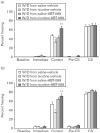ABT-089, but not ABT-107, ameliorates nicotine withdrawal-induced cognitive deficits in C57BL6/J mice
- PMID: 25426579
- PMCID: PMC4459497
- DOI: 10.1097/FBP.0000000000000111
ABT-089, but not ABT-107, ameliorates nicotine withdrawal-induced cognitive deficits in C57BL6/J mice
Abstract
Nicotine withdrawal produces cognitive deficits that can predict relapse. Amelioration of these cognitive deficits emerges as a target in current smoking cessation therapies. In rodents, withdrawal from chronic nicotine disrupts contextual fear conditioning (CFC), whereas acute nicotine enhances this hippocampus-specific learning and memory. These modifications are mediated by β2-subunit-containing (β2*) nicotinic acetylcholine receptors in the hippocampus. We aimed to test ABT-089, a partial agonist of α4β2*, and ABT-107, an α7 nicotinic acetylcholine receptor agonist, for amelioration of cognitive deficits induced by withdrawal from chronic nicotine in mice. Mice underwent chronic nicotine administration (12.6 mg/kg/day or saline for 12 days), followed by 24 h of withdrawal. At the end of withdrawal, mice received 0.3 or 0.6 mg/kg ABT-089 or 0.3 mg/kg ABT-107 (doses were determined through initial dose-response experiments and prior studies) and were trained and tested for CFC. Nicotine withdrawal produced deficits in CFC that were reversed by acute ABT-089, but not ABT-107. Cued conditioning was not affected. Taken together, our results suggest that modulation of hippocampal learning and memory using ABT-089 may be an effective component of novel therapeutic strategies for nicotine addiction.
Figures





References
-
- Bitner RS, Bunnelle WH, Decker MW, Drescher KU, Kohlhaas KL, Markosyan S, et al. In vivo pharmacological characterization of a novel selective alpha7 neuronal nicotinic acetylcholine receptor agonist ABT-107: preclinical considerations in Alzheimer's disease. J Pharmacol Exp Ther. 2010;334:875–886. - PubMed
-
- Blake J, Smith A. Effects of smoking and smoking deprivation on the articulatory loop of working memory. Hum Psychopharmacol Clin. 1997;12:259–264.
Publication types
MeSH terms
Substances
Grants and funding
LinkOut - more resources
Full Text Sources

